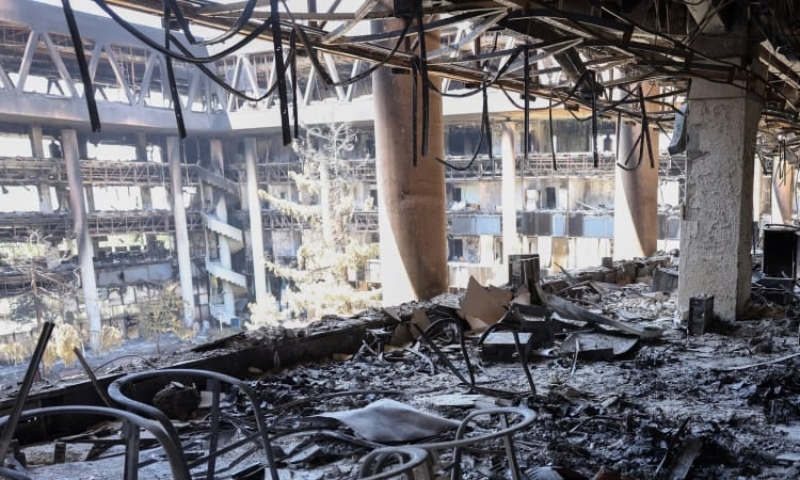- Tarique Rahman to Return Home With Daughter on Dec 25 |
- ILO praises Bangladesh’s labour reforms, new milestones |
- Depositors stranded as Sammilito Islami Bank is in liquidity crisis |
- BNP faces uphill task to reach seat-sharing deal with allies |
- Bangladesh rejects India’s advice; vows free, fair polls |
Iran Warns of 'More Devastating' Retaliation Against Israel

A charred interior view of a building devastated by fire and airstrikes, showing twisted metal, collapsed ceilings, and severe structural damage in the aftermath of recent attacks. Photo collected
Iran’s President Masoud Pezeshkian on Saturday warned of a "more devastating" response if Israel continues its nine-day bombing campaign, asserting that the Islamic Republic will not abandon its nuclear programme “under any circumstances.”
Israel claimed it had killed three more Iranian commanders in its unprecedented offensive. Foreign Minister Gideon Saar also said Iran’s alleged progress toward developing a nuclear weapon had been set back by two years.
“We will do everything we can to remove this threat,” Saar said, vowing to continue the military onslaught.
Since June 13, Israel and Iran have exchanged waves of strikes. On Saturday, Israel said it had attacked Iran’s Isfahan nuclear site for the second time. The UN nuclear watchdog confirmed that a centrifuge workshop had been hit. Later, Iranian media reported Israeli strikes on Shiraz, a city hosting military bases.
Early Sunday, Iran’s Revolutionary Guard said it launched a “vast” wave of “suicide drones” targeting “strategic locations” across Israel.
While Iran denies seeking an atomic bomb, President Pezeshkian declared its right to a civilian nuclear programme was non-negotiable.
In a phone call with French President Emmanuel Macron, Pezeshkian reiterated Iran’s willingness to build confidence around peaceful nuclear activities, but said, “We do not agree to reduce nuclear activities to zero under any circumstances.”
Referring to Israel’s attacks, he warned: “Our response to the continued aggression of the Zionist regime will be more devastating.”
Iran’s armed forces also threatened to strike any shipments of military aid to Israel, regardless of the country of origin.
Meanwhile, former US President Donald Trump warned that Iran had “a maximum of two weeks” to avoid potential American air strikes, as Washington weighed whether to enter the conflict.
Iranian Foreign Minister Abbas Araghchi met diplomats from Britain, France, and Germany in Geneva and participated in an OIC meeting in Istanbul. He signalled conditional openness to diplomacy, stating that talks with the US could resume if aggression ends and accountability is ensured.
“We’re not prepared to negotiate with the Americans as long as the aggression continues,” Araghchi said.
Trump, however, dismissed the idea of halting Israeli attacks to enable diplomacy, saying, “If somebody's winning, it’s a little bit harder to do.”
Reports indicated that US B-2 stealth bombers capable of carrying powerful bunker-busting bombs were in transit across the Pacific, fuelling speculation of US military involvement.
In Yemen, Iran-backed Huthi rebels threatened to resume attacks on US vessels in the Red Sea if Washington joins the war.
Iran’s health ministry reported over 400 killed and more than 3,000 injured in Israeli strikes. Iran’s retaliatory attacks have reportedly killed at least 25 people in Israel.
Israel’s military said it launched fresh strikes near Bandar Abbas in southern Iran, targeting drone storage and weapons facilities. Iran’s air defences were activated in response.
Iran also launched drone and missile attacks on central Israel, striking a residential building, though no casualties were reported. Iran claimed it had hit 14 strategic military targets including Haifa’s Sail Tower, the city’s oil refinery, and Ovda airbase.
Israel also claimed it thwarted an Iranian terror plot in Cyprus targeting its citizens.
More than 450 missiles and about 400 drones have reportedly been fired at Israel so far. In Tel Aviv, residents expressed fatigue under the constant threat, while Tehran remained relatively calm.
Western powers have expressed growing alarm over Iran’s advancing nuclear programme, particularly its uranium enrichment to 60 percent—levels close to weapons-grade.
The IAEA’s Rafael Grossi noted that Iran is the only non-nuclear-armed country enriching uranium to that level, though his agency has found “no indication” of a systematic bomb-making effort.

